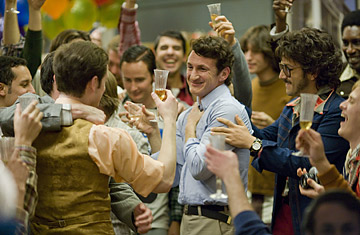
Sean Penn stars as gay rights activist Harvey Milk in Gus Van Sant's Milk
(2 of 3)
On Nov. 27, 1978, Milk and Mayor George Moscone were shot dead by supervisor Dan White, an Irish-American Vietnam vet and former cop who had befriended Milk but opposed his agenda. Thousands of angry Milk-men filled the streets of San Francisco; their mourning turned to rioting. Diane Feinstein, president of the Board of Supervisors, succeeded Moscone as mayor. Tried for murder, White pleaded diminished capacity due to depression and a junk-food diet — what became known as the "Twinkie defense." His conviction on the reduced charge of voluntary manslaughter triggered another night of riots. White served five years of his seven-year sentence and, the year after his release, committed suicide: carbon-monoxide poisoning, in his car in his garage, a loop of "The Town I Loved So Well" playing on the tape deck. (See TIME's Top 10 Biopics.)
White is so compelling and conflicted a figure that the trick of any Milk project is to keep him from abducting it. The 1984 documentary The Times of Harvey Milk devoted its whole third act to White's trial, which was the entire subject of Emily Mann's panoramic docudrama The Execution of Justice, also from 1984. Josh Brolin plays him here and has much more to work with than he did as George Bush in W. This is a portrait, from the inside, of a man who fought the validation of homosexuality because his Catholic faith and his constituents wouldn't stand for it — and because, the movie suggests, he was roiled by unresolved gay issues of his own. ("I think he's one of us," Harvey whispers.) As a performance, it's Brolin's best since No Country for Old Men, which means very good indeed.
But Milk isn't about Dan White, except as a repository of the straights' resentment that dogged Milk and brought him down. The script by Dustin Lance Black, who worked on HBO's polygamy series Big Love (he was the only Mormon on the writing staff), is all about process: how Harvey Milk changed things. His style was charm mixed with genial bullying. He conveyed passion with good humor. In the movie, challenged by White to answer if two men can reproduce, he replies, "No, but God knows we keep trying." On the streets, he'd pick up a bullhorn and shout, "My fellow degenerates ... my name is Harvey Milk, and I'm here to recruit you." He pestered and seduced citizens into signing petitions, knocking on doors, getting out the vote of a segment so disenfranchised they'd never had anything or anyone to vote for before.
Designated a "gay politician," Milk was at least as much the latter as the former — a genius in convincing people that what he wanted was what they needed. So is the movie. It revels in showing how Milk built his campaign staff from the lovers and locals who wandered into Castro Camera; how he fought the city's gay establishment, until then discreet in identifying itself; how he debated John Briggs, the sponsor of Prop. 6, to a standstill and was instrumental in having the initiative defeated by more than a million votes. You've never seen this before: a movie that builds a state referendum into a suspenseful and agitating emotional climax. Ain't politics grand?
